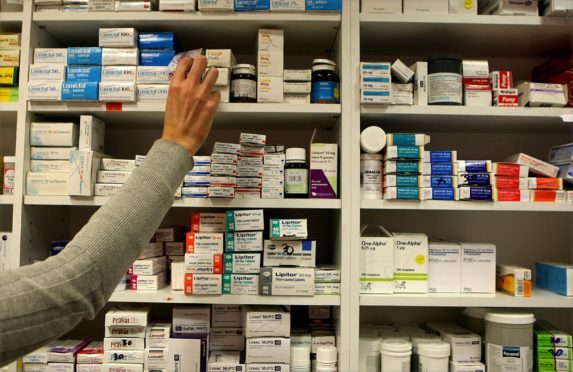Free prescriptions to over-the-counter treatments such as Deep Heat could be scrapped as part of proposals to tackle a £2million overspend.
Patients across Aberdeenshire could either lose free prescriptions to certain drugs, or be given cheaper versions.
The Aberdeenshire Health and Social Care Partnership (AHSCP) has recommended certain drugs that lack “sufficient evidence to support their use” be cut from prescription services.
It has also suggested a “de-prescribing strategy” should be put in place to take current patients off the medicines.
Some of the 12 drugs the AHSCP has urged the Aberdeenshire Integration Joint Board (AIJB) to consider for removal or replacement under the free prescription model are herbal treatments, which have “various uses, but lack evidence to support prescribing”.
The supplements Glucosamine and Chondroitin, which are used by some people to treat certain symptoms of osteoarthritis, are also highlighted in a new report by the AHSCP.
However, the report says they are “unregulated and should not be prescribed.”
The document, which will go before the Aberdeenshire Integration Joint Board (AIJB) this week, raises concerns that an increase in prescriptions across the region’s health and social care services could have a major impact on costs.
The partnership fears health bosses could be faced with an overspend of around £1.8million for the 2017/18 period.
It is hoped that by stopping the prescriptions, or finding cheaper alternatives to the 12 treatments, around £154,000 could be saved in Aberdeenshire.
The report also highlights that an additional £390,000 of vital healthcare funding could be saved in the region if branded medicines are swapped out for generic ones.
Last night, north-east MSP Lewis Macdonald warned there could be problems to take patients off a treatment they have already been prescribed.
He said: “I think if something has been prescribed already, it can be a more difficult case to argue for a change of prescription because if you’ve already been told by your doctor that a treatment is right for you, it can be hard to accept there’s something else which is just as good.
“But whatever happens, making sure people get the effective treatments that they need should be the top priority.”
The Labour MSP added: “They will have some tough decisions to make, because of course the budget for prescriptions is not infinitely flexible – they need to be able to justify every single thing they spend money on.
“But what is important is that at the end of the process, everybody still has access to the medicine they need and are prescribed by their medical practitioners.”
Prescription charges were abolished in Scotland in 2011 following a move by the SNP Government.
Scottish Conservative public health spokeswoman Annie Wells MSP said: “Given the financial strain our health service is under it’s hardly surprising that boards are looking to cut costs.
“Many Scots will rightly wonder if it is sensible to spend so much money on prescribing these drugs if they have proven to be ineffective or are available cheaply over the counter.”
The 12 treatments the Aberdeenshire Health and Social Care Partnership (AHSCP) has recommended no new patients be prescribed are:
- Glucosamine and chondroitin, popular supplement for osteoarthritis patients
- Herbal treatments, often used to self-medicate coughs and colds
- Lutein and anti-oxidants, supplements used to treat eye issues – particularly macular degeneration, which causes sight loss
- Omega fatty acid compounds, used as a supplement by some patients with cardiovascular disease
- Oxycodone and Naloxone combination product, used for pain relief. However the AHSCP has recommended oxycodone be prescribed alone.
- Paracetamol and tramadol combination product, used for pain relief
- Perindopril arginine, used to treat high blood pressure and heart failure
- Rubefacients, such as Deep Heat and menthol gels
- Trimipramine, anti-depressant
- Once-daily tadalafil, used for erectile dysfunction
- Lidocaine plasters, used to treat lasting nerve pain in an area previously affected by shingles
- Liothyronine, used to treat issues with the thyroid gland
